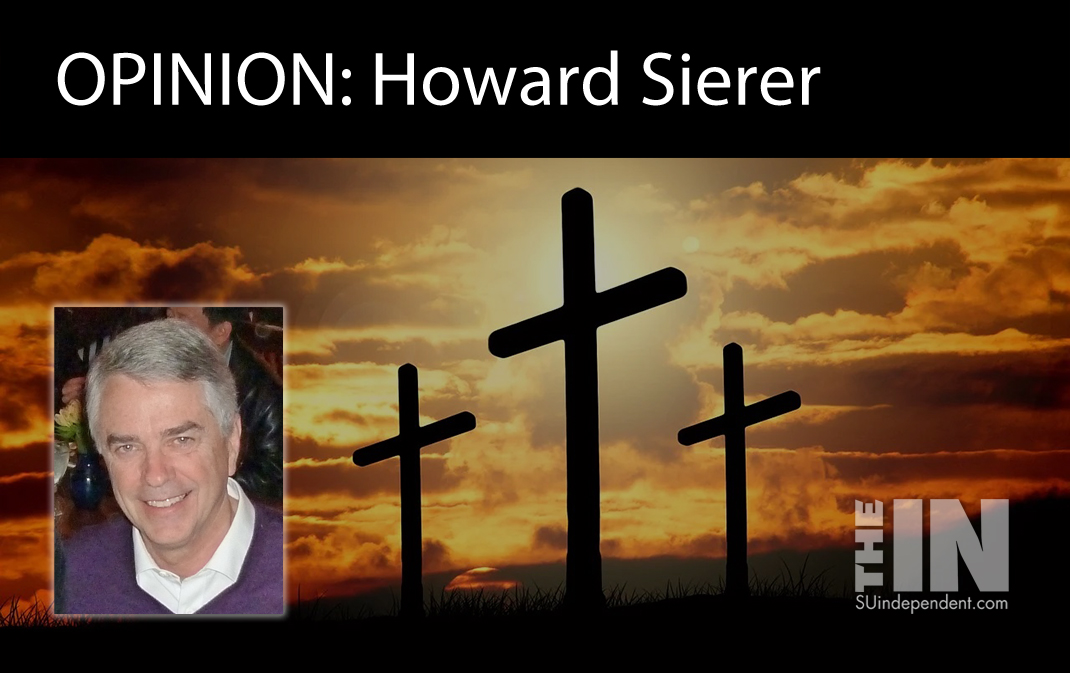
Free Exercise of Religion on a Slippery Slope
– By Howard Sierer –
Where do we draw a line limiting the free exercise of religion guaranteed by the First Amendment? For those tempted to answer that no limiting line should be drawn, read on.
When religious beliefs lead to action, especially when those actions might harm others, those actions are necessarily subject to laws and regulations. And laws and regulations are necessarily subject to judgment.
No one in this country would argue that cannibalism or female genital mutilation should be protected as the free exercise of religion. Yet both are practiced by some religions elsewhere in the world resulting in obvious harm to unwilling victims.
Surprisingly, parents in this country are allowed free exercise even when harm to their children may result.
An extreme case: The state of Idaho allows faith-healing parents to withhold medical treatment from their children when they suffer from easily treated ailments. Under Idaho law, parents will not be criminally charged even if their children die.
Forty-four states allow parents not to have their children vaccinated on religious grounds while some states allow parents to ignore compulsory education laws.
Like most Americans, I’m saddened that these parents are allowed to put their children at risk. On the other hand, in the name of protecting children, state governments are beginning to impinge on another longstanding religious practice.
State laws exempt priests, ministers, and rabbis from crime reporting provisions when hearing penitents’ confessions. Those exemptions are disappearing when the crime disclosed is child abuse.
No one condones child abuse but once any exception is made, it’s fair to ask if other crimes will be added to reporting requirements. If child abuse must be reported, why not murder, rape or assault? These laws start down the slippery slope toward unconstitutionally restricting free exercise and have yet to be fully tested in court.
Courts have allowed restrictions on religious practices that violate laws that apply broadly to all citizens and are not specifically targeted at religion.
For example, in Employment Division v. Smith (1990), the Supreme Court rejected a claim that the free exercise clause obliged the state of Oregon to accommodate Native Americans’ sacramental use of peyote. The rationale: Oregon’s law prohibiting the hallucinogen was “neutral” and “generally applicable,” and not targeted against a religious practice per se.
Well down the slippery slope are abortion and same-sex marriage.
Many mainstream churches, including the Catholic Church and most evangelical denominations, oppose abortion, regarding it as antithetical to the sanctity of life. This same religious coalition opposes same-sex marriage. Nonetheless, both practices are now protected by Supreme Court rulings handed down in the last 50 years; nonetheless, related legal questions remain.
Progressives defend both abortion and same-sex marriage as protecting the rights of individuals to live their lives as they wish. They say the impact of these individual choices are limited to the individuals involved.
Yet progressives undermine this personal freedom argument when they take to court those refusing to provide goods and services that support these practices. Progressives insist that abortion and same-sex marriage, implemented in the name of individual choice, can only be protected by denying others their individual choices.
When individuals exercising their religious freedom object to being coerced, progressives dismiss these objections as excuses to disguise bigotry.
In my opinion, progressives who attempt to apply non-discrimination laws and regulations to individuals with religious objections have their shoes on the wrong feet. They assume that non-discrimination laws and regulations are paramount.
Instead, since the free exercise of religion is expressly guaranteed by the First Amendment, the Cornell Law School explains that “strict scrutiny” must be applied to any claim of discrimination. “To pass strict scrutiny, the legislature must have passed the law to further a ‘compelling governmental interest,’ and must have narrowly tailored the law to achieve that interest.”
As a result, progressive overreach has been slapped down by the Supreme Court on both abortion and same-sex marriage. The Court defended hospital medical staff from being coerced into participating in abortions and nuns from being forced to provide abortifacients. Likewise, the Court defended a wedding cake supplier from demands he serves same-sex weddings.
To me, the salient factor in these cases was the availability of other willing suppliers. Progressive plaintiffs chose to coerce a nurse, nuns, and a wedding cake supplier when alternatives were readily available; their real intent was to establish nationwide, court-ordered acquiescence to progressive social views.
I agree with the University of Pennsylvania’s Professor David Skeel that “the expansion of government over the last several decades has made principled pluralism – the effort to accommodate individuals and groups with divergent beliefs – increasingly difficult at precisely the same time as the country has become more diverse than ever before.”
Progressives would like to push religion completely out of any consideration in formulating public policy, but that pesky Constitution keeps getting in their way. The next time religion comes under progressive attack, ask yourself if its challengers have demonstrated a “compelling state interest” and propose a “narrowly tailored” means to accomplish it.



